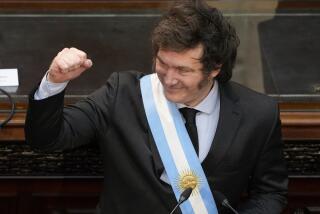No Real Progress Seen on Key Issues as Contadora Talks Adjourn
- Share via
PANAMA CITY — The Central American peace talks adjourned for a month Thursday night after a three-day session characterized by diplomatic bickering that blocked significant breakthroughs.
An attempt to have the Latin American peace negotiators visit the tense border between Nicaragua and Honduras, where fighting has intensified, was blocked by Honduran objections, diplomatic sources said.
The increased combat is the result of a recent offensive by the Nicaraguan army that has sent thousands of right-wing guerrillas, trained and financed by the Reagan Administration at one time, fleeing toward the border.
Victor Hugo Tinoco, the head of the Nicaraguan delegation, said Honduras filed a formal complaint that one of its soldiers was killed during an artillery exchange between Nicaraguan and Honduran forces on May 9.
Proposal Blocked
A proposal by the diplomatic mediators to initiate a “political reconciliation” between Nicaragua and the guerrillas, called contras, that would ultimately end the fighting was blocked by Tinoco, the vice minister of foreign affairs of his country.
The Nicaraguans contend that the contras do not represent a legitimate political opposition group because they are “Yankee mercenaries.”
The negotiations represented the second session of talks held this year under the auspices of the Contadora Group--Colombia, Mexico, Panama and Venezuela--with five Central American nations in an effort to agree on a regional peace treaty.
In September, Nicaragua approved a draft treaty prepared by the Contadora Group. That version was rejected by a bloc consisting of El Salvador, Honduras and Costa Rica. Guatemala is the fifth Central American participant in the talks.
The current round of talks made it clear that Nicaragua has been forced to back down from a policy of refusing to discuss significant changes in the September version of the treaty, a policy repeatedly expressed by Nicaraguan President Daniel Ortega.
“Everything is once again under discussion,” Tinoco conceded after the meeting ended. “This is something we sought to avoid, but we have no choice. We would have preferred modifications or refinements of the original treaty rather than wholesale changes.”
He added, “It has become evident that these countries (the U.S. allies in the region) and the United States itself do not accept the basic version.”
Nevertheless, he vowed, Nicaragua will not accept a treaty that does not prohibit international military maneuvers in the region such as the current war games in Honduras.
A prohibition on such maneuvers in the earlier draft of the treaty met with severe objections from the Reagan Administration, which considers them essential to the preservation of a U.S. military presence in the unstable region.
Much of the concrete work of the negotiators focused on secondary details such as the makeup of ad hoc commissions to investigate border disputes in the area and improvement in regional security communications.
“We made progress on issues that I would say are of secondary importance,” said Jorge Ramon Hernandez, the head of the Honduran delegation. Tinoco, interviewed separately, agreed.
The negotiators agreed to dismantle the base camps of “destabilizing forces,” a provision aimed at the contras, diplomats said. The refusal of Honduras to acknowledge the existence of such camps inside its territory, however, indicates no action will be taken for now.
Although each of the governments represented in the mediation group, the four Contadora nations, has refused to endorse the Reagan Administration’s economic embargo of Nicaragua, the group as a whole refused to declare itself against the embargo despite a Nicaraguan request to do so.
More to Read
Sign up for Essential California
The most important California stories and recommendations in your inbox every morning.
You may occasionally receive promotional content from the Los Angeles Times.













